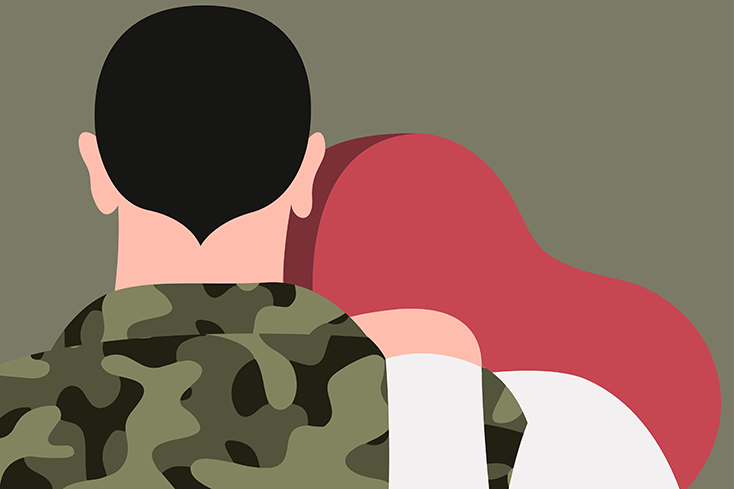
Veterans make up 10.9% of Madison County’s population. That’s significant, as up to 30% of veterans experience symptoms of Post Traumatic Stress Disorder. But experts say it’s important to remember that anyone who has experienced trauma can develop PTSD.
June is #PTSDAwarenessMonth and June 27 is #PTSDAwarenessDay. This month (and every month) there are steps you can take to support a loved one suffering from this complex mental health condition.
1. Learn the signs and symptoms.
Like with any mental illness, stigma surrounding PTSD may delay or prevent individuals from seeking treatment.
Learn from trusted resources–like the National Institute of Mental Health (NIMH), National Alliance on Mental Illness (NAMI), or Substance Use and Mental Health Services Administration (SAMHSA)–about the signs and symptoms of this mental health condition. The U.S. Department of Veterans Affairs also provides a helpful list.
2. Learn who PTSD can affect.
PTSD can affect anyone that has experienced a shocking, scary, or dangerous event, not just military veterans. This includes civilian survivors of a sexual assault, serious accident, natural disaster, or other traumatic event. It can impact any person of any age. For some, PTSD may begin long after the event occurs.
Assigning PTSD exclusively to service members can delay the recognition of symptoms and treatment for others. Read this blog from NAMI: “PTSD and Trauma: Not Just for Veterans.”
“Trauma doesn’t discriminate,” says John Schmitt one Madison County resident and military veteran with a PTSD diagnosis. He says that “victims of human trafficking and occupational trauma for our first responders” are also potentially at risk.
3. Communicate openly with your loved one.
This blog from Psych Central offers 6 ways to help create a positive environment throughout your loved one’s recovery journey.
Examples include: Communicate with your partner to learn what makes them feel safe. Offer words of reassurance to help offset fear. Ask questions about their symptoms and triggers. Practice grounding exercises alongside your loved one. Identify and affirm their strengths.
As an individual in recovery, Schmitt adds, “What makes me feel most supported is honest conversation. Specifically, being met by honest curiosity from those who do not have it, as opposed to them bringing their preconceptions and stigmas to the conversation. People have such a preconception of PTSD that has been misinformed through pop culture and 20 years of war.”
4. Encourage professional evaluation and treatment.
PTSD can be treated, but most don’t seek the help that they need, or know that it is available. If your loved one might be at risk or experiencing symptoms of PTSD, encourage them to seek professional help.
There are several forms of treatment available for PTSD, including talk therapy, Cognitive Behavioral Therapy (CBT) techniques, Eye Movement Desensitization and Reprocessing (EMDR) Therapy, Accelerated Resolution Therapy (abbreviated version of EMDR), and group therapy. North Alabama veterans may be interested in a pilot project through WellStone which offers the Stellate Ganglion Block (SGB) shot at no cost.
Schmitt reminds us not to underestimate the power of supplemental exercises at home in addition to therapies and medication. “There were things along the way that I never thought of as therapeutic but can honestly now say probably saved my life. Songwriting and exercises in mindfulness were the foundation of much of my recovery,” Schmitt states.
To learn more about professional treatment options and to access care, call WellStone’s Access to Care Line at 256.705.6444 for Huntsville and 256.255.1020 for Cullman.
If you or a loved one is in crisis now, call or text 988 or chat 988Lifeline.org to speak with a trained, compassionate crisis counselor. Veterans can call 988 and press 2 to connect to the Veterans Crisis Lifeline.
5. Know the specific resources available to veterans in North Alabama.
A myriad of resources is available to veterans in Madison County, Cullman County and surrounding communities. For assistance with navigating treatment options and scheduling appointments, call WellStone’s Access-to-Care Line to connect with Kelli Glass, Veterans Care Coordinator at WellStone.
WellStone is North Alabama’s mental healthcare leader, expanding access to care for Madison County, Cullman County and surrounding communities.
This blog is not intended to serve as professional medical advice. Individuals should speak directly with a licensed medical professional for diagnosis and treatment options.
Last updated on 4/30/24.
